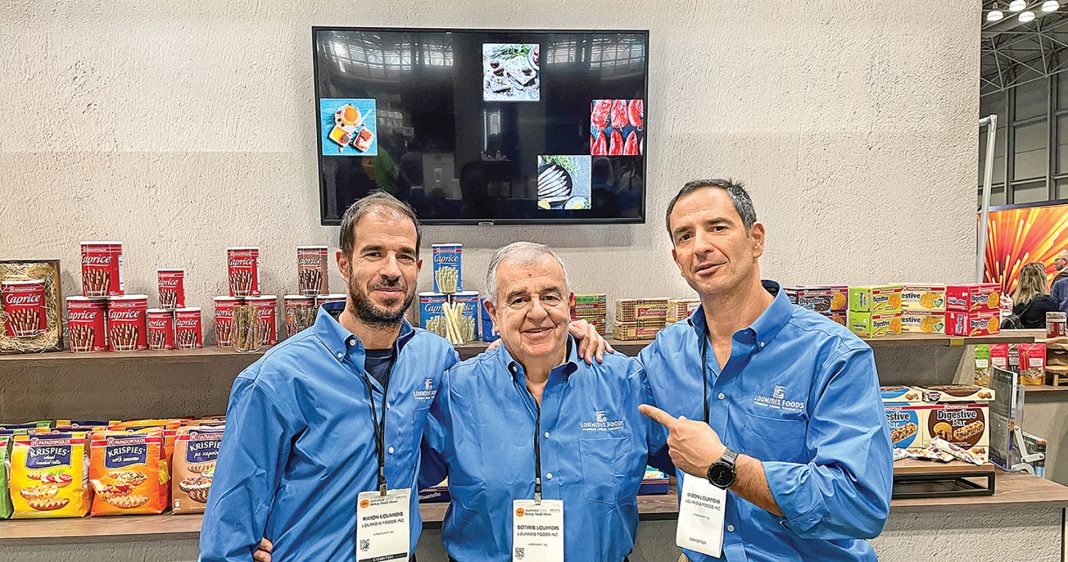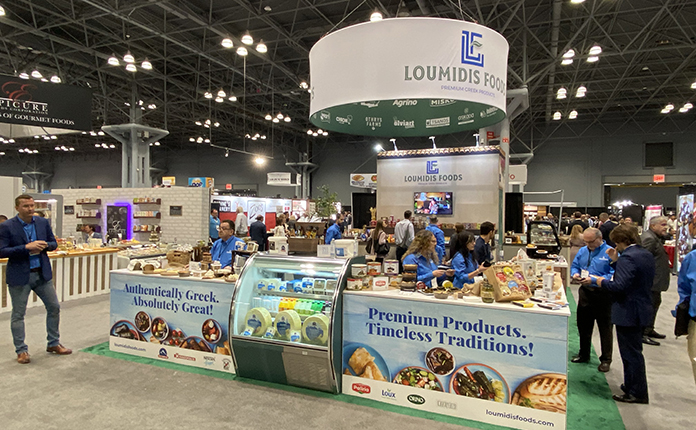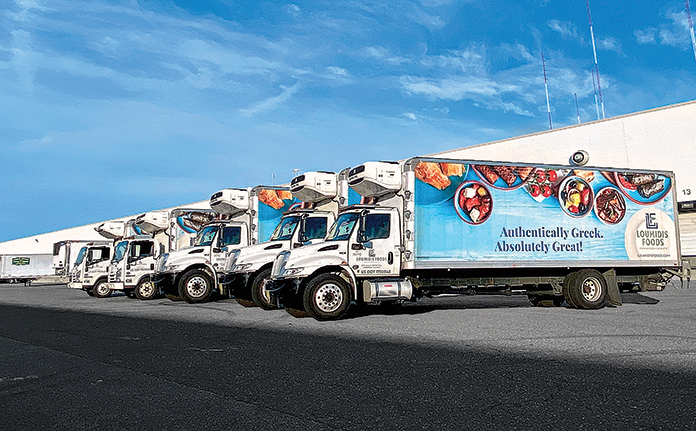America may seem as the promised land of all opportunities for companies seeking to export, but things seldom are as they seem. Undoubtedly, it is a lucrative market with great potential, but before this potential is captured, there are specific rules, strict label compliances and marketing requirements that need to be met. Iason Loumidis, managing shareholder at Loumidis Foods Inc., talks to Ambrosia Magazine about today’s challenges and the art of being a successful business in the USA for over 30 years.
Interview: Charitomeni Vonta
Most -if not all- Greeks associate the name “Loumidis” with the famous traditional Greek coffee Loumidis Papagalos. And they have every reason to do so: in 1920, three brothers, Antonis, Nikos and Iason, opened a small “general commerce store” on Retsina Street in Piraeus with all sorts of items, and, of course, coffee, which gradually became their main trade product, inextricably linked to their name. In 1987 the company was sold to Nestlé by the three brothers’ sons, so that the brand could continue to expand and be part of the Greek culinary heritage. It was around that time that Sotiris Loumidis, Iason’s son, decided to do business in the USA, starting with importing Loumidis Papagalos and Nescafé coffee from Nestlé Hellas, along with other Greek products. Today, Loumidis Foods Inc is run by the third generation, Iason and Kimon Loumidis, Sotiris’ sons, and prides itself for a carefully built success story.
Where is the company located, and which brands are currently in your portfolio?
Loumidis Foods’ operations are clustered on the Northeast/Mid-Atlantic part of the country -we are based in New Jersey, but our primary market is the Tri-state area (New Jersey, New York, Connecticut), including the neighboring states of Pennsylvania, Massachusetts, and Rhode Island. We represent exclusively many iconic Greek food manufacturers, such as Nestle Hellas, Papadopoulos, Paliria, Olympus Dairy, Ioniki Filosophy, Cretamel, Agrino, Loux, Hellenic Fine Oils, Olympos (Papayianni Bros), Stathakis Family, Boudouris Family, Trata, Askada Farm, MastiH2O, Othrys Farms, Kriton Artos, Tsanos Bakery and Elviart. In addition to our exclusives, we act as representatives of many great brands, such as Rodoula, Misko, Nouns Creamery, Megas Yeeros & MegaMeatless, Loukoumiland, Chion, and Fruit Hellas. Finally, we also have our own trademark brands (MFG-My Favorite Gyro, Loumidis, My Favorite Greek Yogurt, Mediterranean Nation).
What is your distribution network? Does it include a HORECA channel?
Our operational profile consists of two main roles: We act as (master) importers for the entire U.S. and as regional distributors for the Northeast/Mid-Atlantic market, delivering directly with our own distribution fleet. Moreover, we manage directly key-accounts across the nation (namely medium/large scale supermarket chains and national restaurant chains). Finally, we have distribution partners in 21 states (including some Canadian territories), practically covering half the country. Currently, our active database consists of over 1.000 customers, we import and trade more than 470 SKUs, and we receive and handle on average 20 containers monthly. What you call HORECA channel, we call Foodservice, covering restaurants, catering facilities, casual eatery, festivals etc., and comprises almost half of our gross revenue business (45%).
Which products are your 10 top sellers, and which are the Greek products that you consider having the greatest growth prospects in the American market?
Our best sellers are iconic Greek delicacies, such as Loumidis Papagalos (traditional Greek coffee), Nescafé (the famous Greek Frappé), Paliria (stuffed vine leaves with rice, “dolmadakia”), Caprice Papadopoulos (hazelnut wafers), Olympus Dairy PDO Greek Feta, Ioniki Filosophy (phyllo products), Rodoula (savory pies and Greek deserts), Orino Honey by Cretamel, Sparta Gold (extra virgin olive oil), Misko (pasta products) and Nouns (Greek yogurt). As for products with export potential, we consider the Mediterranean profile snack category as upcoming, along with savory pies, especially spinach pie, and frozen ready meals (based on All Natural Mediterranean recipes) – products that can fit under the “good-for-your-health” motto, which is the quintessential of the Mediterranean diet.
To put it in a wider perspective, thanks to the groundbreaking, positive impact of the Greek yogurt fad in the last decade, the growing interest of Americans in healthy eating and the benefits of the Mediterranean diet, Greek culinary brand identity has radically improved in the last decade – truth be told, this has not always been the case. Today, the name “Greece” can be considered as an added value for a (food) brand, but we should not rest on our laurels. It is imperative to continue investing and improving the Greek culinary brand identity, because this is an attribute all products, in all categories, can benefit from.
The infamous “success story” is to sellout at satisfactory level, not just “product placement”. The sellout is the real challenge.
We are experiencing a major supply chain crisis worldwide. How does it affect you?
Since we are an active link of this chain it has affected us significantly, but we are handling it better than expected because of our strong organizational structure and constant communication with our suppliers and logistics partners. The inflation, along with port congestion and logistics crisis at all major ports worldwide (COVID and the incident with Evergreen in Suez Canal were the main factors), caused the freight costs to practically triple within a year. And if this was not enough, the recent war outbreak further complicated the supply chain crisis. In our opinion, the situation will continue “as is” at least through the end of 2022, and hopefully begin to stabilize within 2023.
In your opinion, what are the challenges in the American food market today?
Before I give you an answer, we must stress that “American food market” is a misleading term, because there is not one America. There are 50 states with different consumer habits, different retail structure, even different practices by which imported foods are sold, not to mention the diverse U.S. demographics. That said, in all states the greatest challenge is to stand out, in terms of quality (that goes without saying), but in terms of authenticity, too. Having a good product is not enough. If a company wants to export to America, they have to choose their target market and channel first, and at least do some preliminary market research: identify the needs of the consumers, the way competitive products are being presented and promoted – even details, such as portion quantity. Allocated shelf space at major supermarkets (even smaller chains or independent stores) is granted for a short period of time, through hard-bargain “real estate” deals and the infamous “success story” is to sellout at satisfactory level, not just “product placement”. A food manufacturer must be ready to pursue and invest towards this challenge, because, in most cases, they only get one shot to present their brand to the buyer.
What are your company’s next steps?
Our goal is to become a reliable reference/source for Premium Greek Products in the U.S. market. Our operational goal is to excel in inventory forecasting & management and eventually pursue a perfect “order fulfillment” ratio, a key element for the success of every retail / foodservice customer we have. By the end of 2022 we will complete our premises expansion (doubling warehouse space) in New Jersey, which will allow us to streamline our existing collaborations and enable us to introduce more great Greek brands to the American market. In relation to business development, we have plans, but at the moment, I can only give you a few key words: education, health and bespoke MKT services to the foodservice sector. The Greek / Mediterranean Diet can be directly connected to good health. This is a strong asset in our hands, on which we can -and must- build. We at Loumidis Foods endeavor to become the source for the authentic Greek food experience.


















 Loumidis Foods stand in the Summer Fancy Food 2022.
Loumidis Foods stand in the Summer Fancy Food 2022. The company delivers with its own distribution fleet within the tri-state region, Pennsylvania and the upstate New York region.
The company delivers with its own distribution fleet within the tri-state region, Pennsylvania and the upstate New York region.

